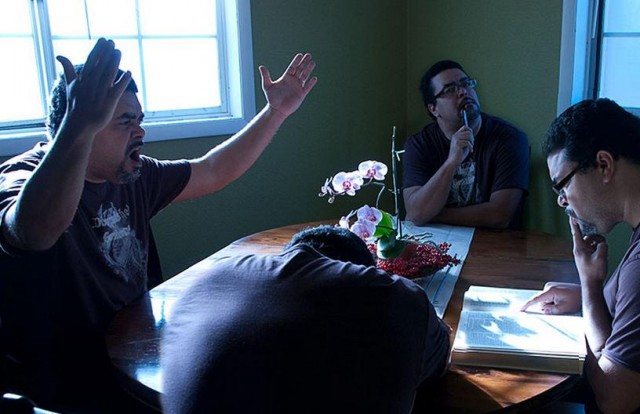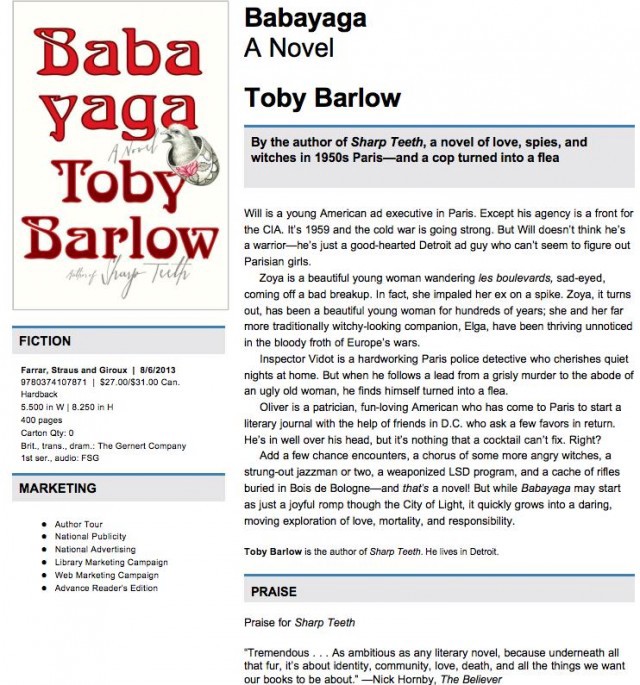This Witch Wrote My Book!
by Patrick Robbins

August 11th was a huge day in my life. I was at Think Coffee on Fourth Avenue. I had just finished, at age 27, my very first novel. I told the barista, who gave me a high five. This was nice of him, given that this probably happens at said coffee shop way more often than we’d like to think.
I had been working on it for two-and-a-half years, showing it to no one, periodically reading it aloud to only two people — my partner and my ex. The book was a story about the Baba Yaga, the witch from Ukrainian folklore. I first encountered her as a child in Neil Gaiman’s Sandman books and I thought that she was a really interesting take on the archetypal crone. When I began working on a novel, I wanted to write something fantastic, something to take my mind off my science-based Master’s program, and so I chose her as my subject. The novel’s title was simply The Baba Yaga. Starting out, I wanted it to be a cinematically written tale with many interweaving plot points. I would pit the titular witch against the state, exploring the idea of witchcraft as a metaphor for unofficial or covert forms of power. There would be romance, and adventure! And it would be written in five parts, because that’s a nice, digestible number.
My graduate program ended, but the novel continued — by then, it had taken on a life of its own, and become more than just a hobby. The novel was taking shape, gaining structure and depth and coherence. This was because I was genuinely putting in the work. I spent hours in coffee shops pondering this or that plot point and asking myself otherwise nonsensical questions (“But how does she even reach the city of the shapeshifters? And why would they help her? Do they have a dog in this fight?” reads one note in the margins). I was spending time on it, for lots of reasons. For one thing, I was becoming proud of it. I could read sections and think to myself, this is good. And on a deeper level, the idea that I was actually going to follow through on something like this — actually finish it, actually accomplish a big project I’d set out to do — had become intoxicating. I worked on it on the bus. I worked on it in my living room, after my roommates fell asleep. I made excuses to leave parties or meetings with friends so that I could work on it instead.
And then I finished, and I was elated. I felt proud of myself for bringing something strange and new into the world. I sent draft copies to ten or so friends, and started researching publishers who might be interested in turning it into a book. During the summer of 2007 I’d interned at FSG, and obviously I thought they’d be an amazing publisher. On the night of August 21st, I looked up their catalog on the Internet, trying to get a sense of whether or not they published work like what I had just written.
And there, shining out from my laptop screen, impossibly, was my novel. “Baba yaga,” spelled out in florid Belle Époque type. It had been written by someone named Toby Barlow.

I couldn’t believe what I was reading. I went to the “read more” section, and read as much of the book as the publisher’s website would allow. Anyone who has worked on a creative project for years will understand the horror that filled me when I realized that, in structure and in writing style (even in fucking title!) someone had written a book bizarrely similar to what I had just finished. My novel was no longer unique, no longer fresh, no longer, well, novel. I felt like I’d been gutted. I screamed. I laughed. I called my partner, who was shaken, but not nearly as unhinged by the news as I was starting to become (“Stop that,” I hissed at him at one point, when the phone went silent. “I can hear you reading.”). I don’t think I unclenched my fists for two hours. I combed through my emails to see if it was possible that I’d sent it out to anyone, some traitor who could have fed my work to this impossible doppelgänger who somehow beat me to the punch. Nothing turned up. Of course this was truly just a horrible coincidence. I slept maybe four hours.
How did this happen? I listed the similarities in my head — cinematic writing style, interweaving plot, witches pitted against the government, a plot with an older witch and a younger witch, the younger of whom begins a love affair with one of the employees of the agency persecuting the witches, a plot split into five sections — and felt like I was losing my sanity. This is impossible, I thought. All of my ideas came from my mind, and mine alone.
Well, yes and no. Here’s the thing — this author and I belong to the same culture. We are predisposed toward the same behaviors and tendencies. Yes, it is a bizarre coincidence that he and I would choose the same subject matter. But given that initial coincidence, it’s fairly easy to see how the other similarities flowed from there. The notion of alternative power structures flows fairly easily from the history of witches (Silvia Federici, anyone?), and the trope of the older witch and the younger witch — the former as crone, the latter as seductress — can be found in mythological traditions the world over. And as far as writing style goes, both Toby Barlow and myself are writing at a moment in literature that is increasingly cinematic, as faster and more interactive forms of media inform our collective consciousness. This is the lesson that I am now learning, and would advise any other writer who finds themselves in my position — what seems maddening and impossible is actually really fairly likely when you consider that all of us are products of our culture. If you start writing something, anything at all, then there is always the chance that you will find yourself the butt of some horrible Barthesian joke. It is humbling, and it will probably make you scream at people you care about, but you probably shouldn’t camp outside the other author’s house in a tent or send dead birds to his publicist.
And in the meantime, remember that your work is probably more unique than you think. Yes, in the heat of the moment, you are more inclined to see the similarities than the differences. But there are always differences. From what I can tell of Barlow’s book, which is actually called Babayaga — another difference! — mine is more of a straightforward fantasy tale, and focuses more explicitly on witchcraft as a metaphor for anti-capitalist thought. And mine will probably be more graphically oriented, with a series of illustrations from a designer friend of mine. Which is not to say one is better than the other. Maybe Barlow’s is great! I’m glad that he wrote his, and I look forward to reading it. The point is that they’re different books. I am still going to try to publish mine, and I’m betting there’s room for both out there in the world.
The sky is not falling if someone writes something similar to what you’ve written. Neither is everyone ripping you off. Remember when zombies were a thing? That’s just how the culture works. When things like this happen, you shouldn’t stop writing, or get discouraged. Your writing is still yours, and you owe it to yourself to pursue it with renewed vigor — as soon as you get over your hangover. Because that first night will be rough.
Patrick Robbins is a writer and activist living in New York City. If anyone wants to publish his manuscript, let him know; it’s a buyer’s market these days. Photo by Eduardo Mueses.
